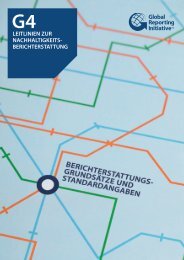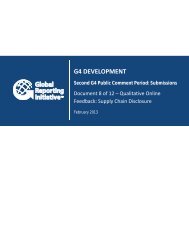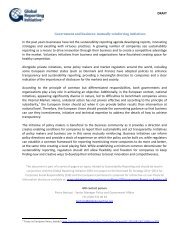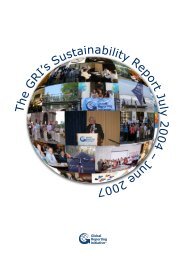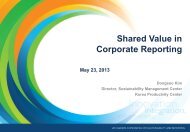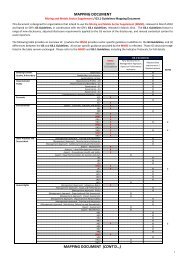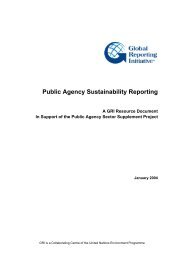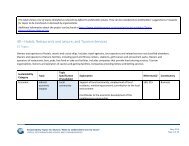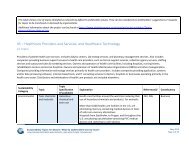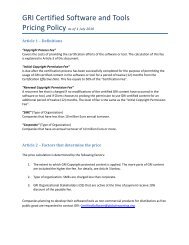Electric Utilities Sector Supplement - Global Reporting Initiative
Electric Utilities Sector Supplement - Global Reporting Initiative
Electric Utilities Sector Supplement - Global Reporting Initiative
Create successful ePaper yourself
Turn your PDF publications into a flip-book with our unique Google optimized e-Paper software.
Relevance<br />
The ILO Decent Work Agenda is framed within the context<br />
of fair globalization, which aims to achieve both economic<br />
growth and equity through a combination of social and<br />
economic goals. The Agenda has four elements:<br />
• Employment;<br />
• Dialogue;<br />
• Rights; and<br />
• Protection.<br />
The structure of the Labor Indicators is broadly based<br />
on the concept of decent work. The set begins with<br />
disclosures on the scope and diversity of the reporting<br />
organization’s workforce, emphasizing aspects of gender<br />
and age distribution.<br />
The approach to dialogue between the organization and<br />
its employees, and the degree to which employees<br />
are organized in representative bodies are covered by<br />
Indicators LA4 (which complements Indicator HR5 on<br />
Freedom of Association and Collective Bargaining) and LA5.<br />
The physical protection and well-being of people at work<br />
is covered by Occupational Health and Safety Indicators<br />
(LA6, LA7, LA8, LA9), which address both the scope of<br />
programs as well as statistical performance on health<br />
and safety.<br />
The scope of employee benefits and contributions toward<br />
a broad social goal of diversity and equal treatment is<br />
addressed by LA14 (Pay Equity), LA13 (Diversity) and<br />
LA3 (Benefits). Indicators in the Economics category also<br />
provide relevant information. The support organizations<br />
provide to employees to enhance personal skills and<br />
potential (which also improves the organization’s human<br />
capital) is represented in Indicators LA10, LA11, and LA12.<br />
Definitions<br />
Total workforce<br />
The total number of persons working for the reporting<br />
organization at the end of the reporting period (i.e., the<br />
sum of all employees and supervised workers as defined<br />
above).<br />
Worker<br />
Generic term for any person performing work, regardless<br />
of the contractual relationship.<br />
Employee<br />
Indicator Protocols Set: LA<br />
An individual who is, according to national law or<br />
practices, recognized as an employee of the reporting<br />
organization.<br />
Supervised worker<br />
An individual who performs regular work on-site for, or on<br />
behalf of, the reporting organization but is not recognized<br />
as an employee under national law or practice.<br />
Independent contractor<br />
An individual legally recognized as being self-employed.<br />
Collective bargaining agreements<br />
There are two types of collective bargaining agreements,<br />
aimed either at employers or workers. Those aimed at<br />
employers are agreements in writing regarding working<br />
conditions and terms of employment concluded<br />
between an employer, a group of employers, or one or<br />
more employers’ organizations. Those aimed at workers<br />
are agreements between one or more representative<br />
workers’ organizations, or, in the absence of such<br />
organizations, the representatives of the workers duly<br />
elected and authorized by them in accordance with<br />
national laws and regulations.<br />
Employee categories<br />
General breakdown of employees based on the function<br />
or department within the organization (e.g., senior<br />
management, middle management, professional, technical,<br />
administrative, production, maintenance, etc.) derived from<br />
an organization’s own human resources system.<br />
General References<br />
• ILO Convention 135, ‘Workers’ Representatives<br />
Convention’, 1971.<br />
• ILO Convention 87, ‘Freedom of Association and<br />
Protection of the Right to Organise’, 1948.<br />
• ILO Convention 98, ‘Right to Organise and<br />
Collective Bargaining’, 1949.<br />
• ILO Declaration on Fundamental Principles and<br />
Rights at Work, 1998.<br />
• ILO Decent Work Agenda, 1999.<br />
• ILO Tripartite Declaration Concerning Multinationals<br />
and Social Policy, 1977, amended 2000.<br />
IP<br />
&<br />
EUSS<br />
EU<br />
Version 3.0/EUSS Final Version<br />
3



